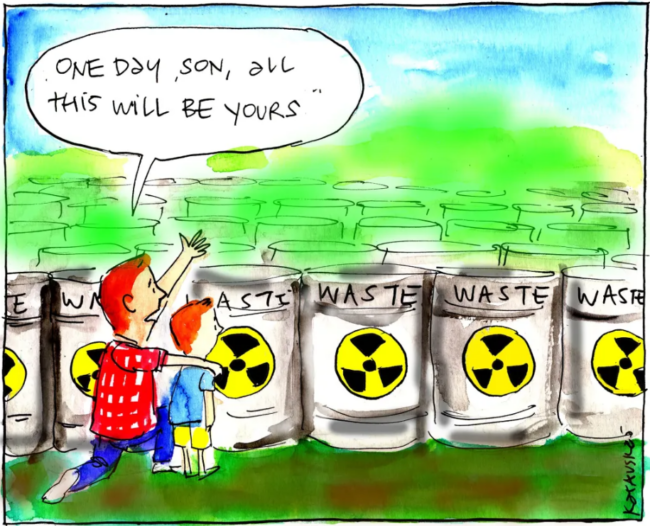![]() By Nick Fitzmaurice
By Nick Fitzmaurice

Image via HEAL Utah.
Rep. Gary Parry (R-Colstrip) is trying to bring nuclear power to Colstrip, with two really bad nuclear bills that passed out of the House in the final rush to transmittal. Nuclear remains the most expensive electricity generation available, and while it has lower greenhouse gas emissions than fossil fuel energy, it comes with a laundry list of other major challenges and injustices. At best, small modular reactors are still at least 10 years away from commercial deployment, while the need for clean energy is pressing. Nuclear energy is dangerous from the time uranium is pulled from the earth and remains dangerous long after its waste must be buried back into it, while Indigenous communities have historically faced the worst of the impacts of uranium and nuclear energy production. Contrary to what the nuclear industry and federal government’s multi-billion dollar PR campaign would lead you to believe, a carbon-free energy system can and will be achieved without nuclear energy.
HB 623 (Rep. Gary Parry, R-Colstrip) invites the siting of radioactive nuclear waste storage facilities in Montana and was passed by a large margin out of the House. There exists no national repository for radioactive nuclear waste, which can remain harmful to humans for up to tens of thousands of years. Since plans for a national waste depository within Nevada’s Yucca Mountain were abandoned due to its unsuitability in 2010, the U.S. remains no closer to a long-term storage solution than when the Nuclear Waste Policy Act (NWPA) was passed by Congress in 1982. Therefore, highly radioactive spent nuclear waste must be stored on-site at nuclear power plants in “short-term” storage casks, likely remaining there for hundreds, if not thousands of years. Contamination risks from increasingly prevalent natural disasters as well as unforeseeable geopolitical instabilities pose a tremendous threat to human and environmental health. Luckily, MEIC secured an amendment on the House floor to require that local counties and any Tribal Nations within 50 miles of a proposed facility must pass a vote of approval before siting a facility in the area.
HB 696 (Rep. Gary Parry, R-Colstrip) invites the siting of hazardous uranium conversion and enrichment facilities in Montana, welcoming the world’s uranium to pass through our state using roadways and rail infrastructure and posing tremendous risks to public health and the environment if there were to ever be a transportation accident. Not only would this promote the development of a harmful uranium extraction industry in Montana, but it would also position Montana as a regional default for hazardous uranium processing as there currently only exists one uranium conversion facility and two uranium enrichment facilities in the U.S. Today, approximately 90% of uranium for use in U.S. nuclear power reactors is imported, so this bill would open the door for Montana to process and manage the hazardous waste streams for all the uranium fuel headed to final destinations outside of Montana. Unfortunately, a similar amendment to the one achieved for HB 623 failed to pass on the House floor by two votes. MEIC will be redoubling efforts on these bills in the Senate.
This article was published in the March 2025 issue of Down To Earth.

